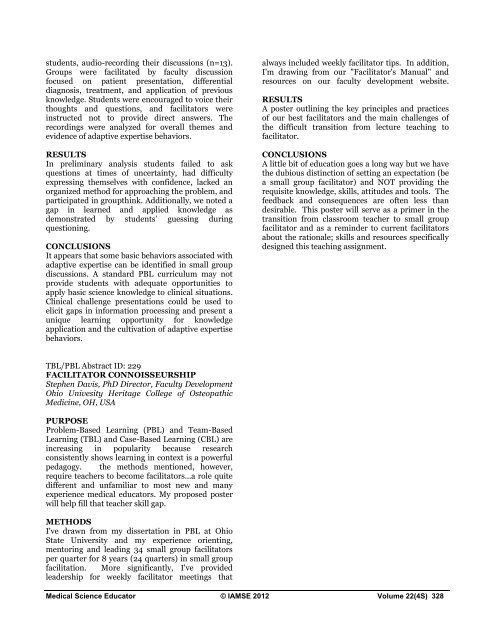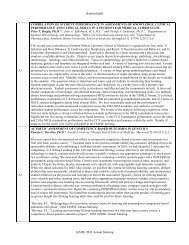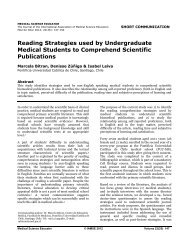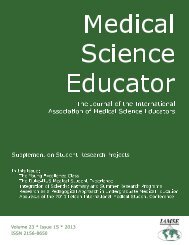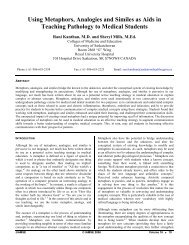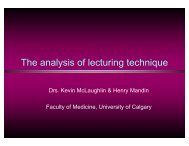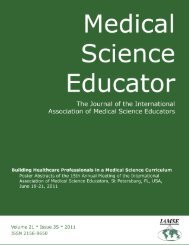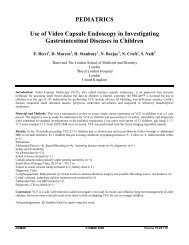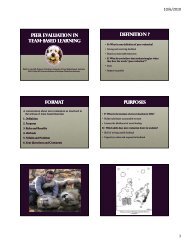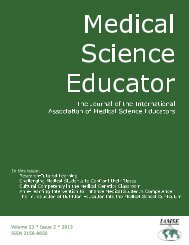Click here to view complete journal in pdf-format - IAMSE
Click here to view complete journal in pdf-format - IAMSE
Click here to view complete journal in pdf-format - IAMSE
Create successful ePaper yourself
Turn your PDF publications into a flip-book with our unique Google optimized e-Paper software.
students, audio-record<strong>in</strong>g their discussions (n=13).<br />
Groups were facilitated by faculty discussion<br />
focused on patient presentation, differential<br />
diagnosis, treatment, and application of previous<br />
knowledge. Students were encouraged <strong>to</strong> voice their<br />
thoughts and questions, and facilita<strong>to</strong>rs were<br />
<strong>in</strong>structed not <strong>to</strong> provide direct answers. The<br />
record<strong>in</strong>gs were analyzed for overall themes and<br />
evidence of adaptive expertise behaviors.<br />
RESULTS<br />
In prelim<strong>in</strong>ary analysis students failed <strong>to</strong> ask<br />
questions at times of uncerta<strong>in</strong>ty, had difficulty<br />
express<strong>in</strong>g themselves with confidence, lacked an<br />
organized method for approach<strong>in</strong>g the problem, and<br />
participated <strong>in</strong> groupth<strong>in</strong>k. Additionally, we noted a<br />
gap <strong>in</strong> learned and applied knowledge as<br />
demonstrated by students’ guess<strong>in</strong>g dur<strong>in</strong>g<br />
question<strong>in</strong>g.<br />
CONCLUSIONS<br />
It appears that some basic behaviors associated with<br />
adaptive expertise can be identified <strong>in</strong> small group<br />
discussions. A standard PBL curriculum may not<br />
provide students with adequate opportunities <strong>to</strong><br />
apply basic science knowledge <strong>to</strong> cl<strong>in</strong>ical situations.<br />
Cl<strong>in</strong>ical challenge presentations could be used <strong>to</strong><br />
elicit gaps <strong>in</strong> <strong>in</strong><strong>format</strong>ion process<strong>in</strong>g and present a<br />
unique learn<strong>in</strong>g opportunity for knowledge<br />
application and the cultivation of adaptive expertise<br />
behaviors.<br />
always <strong>in</strong>cluded weekly facilita<strong>to</strong>r tips. In addition,<br />
I'm draw<strong>in</strong>g from our "Facilita<strong>to</strong>r's Manual" and<br />
resources on our faculty development website.<br />
RESULTS<br />
A poster outl<strong>in</strong><strong>in</strong>g the key pr<strong>in</strong>ciples and practices<br />
of our best facilita<strong>to</strong>rs and the ma<strong>in</strong> challenges of<br />
the difficult transition from lecture teach<strong>in</strong>g <strong>to</strong><br />
facilita<strong>to</strong>r.<br />
CONCLUSIONS<br />
A little bit of education goes a long way but we have<br />
the dubious dist<strong>in</strong>ction of sett<strong>in</strong>g an expectation (be<br />
a small group facilita<strong>to</strong>r) and NOT provid<strong>in</strong>g the<br />
requisite knowledge, skills, attitudes and <strong>to</strong>ols. The<br />
feedback and consequences are often less than<br />
desirable. This poster will serve as a primer <strong>in</strong> the<br />
transition from classroom teacher <strong>to</strong> small group<br />
facilita<strong>to</strong>r and as a rem<strong>in</strong>der <strong>to</strong> current facilita<strong>to</strong>rs<br />
about the rationale; skills and resources specifically<br />
designed this teach<strong>in</strong>g assignment.<br />
TBL/PBL Abstract ID: 229<br />
FACILITATOR CONNOISSEURSHIP<br />
Stephen Davis, PhD Direc<strong>to</strong>r, Faculty Development<br />
Ohio Univesity Heritage College of Osteopathic<br />
Medic<strong>in</strong>e, OH, USA<br />
PURPOSE<br />
Problem-Based Learn<strong>in</strong>g (PBL) and Team-Based<br />
Learn<strong>in</strong>g (TBL) and Case-Based Learn<strong>in</strong>g (CBL) are<br />
<strong>in</strong>creas<strong>in</strong>g <strong>in</strong> popularity because research<br />
consistently shows learn<strong>in</strong>g <strong>in</strong> context is a powerful<br />
pedagogy. the methods mentioned, however,<br />
require teachers <strong>to</strong> become facilita<strong>to</strong>rs...a role quite<br />
different and unfamiliar <strong>to</strong> most new and many<br />
experience medical educa<strong>to</strong>rs. My proposed poster<br />
will help fill that teacher skill gap.<br />
METHODS<br />
I've drawn from my dissertation <strong>in</strong> PBL at Ohio<br />
State University and my experience orient<strong>in</strong>g,<br />
men<strong>to</strong>r<strong>in</strong>g and lead<strong>in</strong>g 34 small group facilita<strong>to</strong>rs<br />
per quarter for 8 years (24 quarters) <strong>in</strong> small group<br />
facilitation. More significantly, I've provided<br />
leadership for weekly facilita<strong>to</strong>r meet<strong>in</strong>gs that<br />
Medical Science Educa<strong>to</strong>r © <strong>IAMSE</strong> 2012 Volume 22(4S) 328


